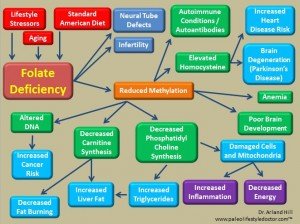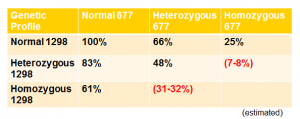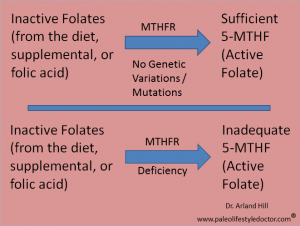Folate
Folate Deficiency Steals Your Energy
A folate deficiency is likely one of the biggest thieves when it comes to your health. Folate, also known as B9, is a significant player in how your body produces energy. Folate is sometimes called folic acid, but this is not technically accurate (more on this to come). For the purpose of our conversation, a folate deficiency robs your body of energy. We often think about energy as just how we feel on a day to day basis. If we feel good, then we say we are energetic. If we wake up tired, we say that we are fatigued. Most the patients that I see come in complaining about some levels of fatigue. It is common. Since a folate deficiency is often a cause of fatigue, this is one of the first things that are we look for. The good news is that a folate deficiency is generally pretty easy to fix.
What is a Folate Deficiency?
A folate deficiency is simply nothing more than a lack of sufficient levels of B9. That is the simplified answer. If all you are interested in is optimizing your health, then correcting a folate deficiency is nothing more than taking some folate, or B9. Folate is a vitamin that is safe to take, especially if taken with B12. However, if you want to understand a folate deficiency at a deeper level, it can have many significant effects that have the potential to cause lasting damage to the body. The most common example of this is altering your DNA. Having a folate deficiency can change your genetic makeup and cause mutations in your genes. Such mutations produced damaged tissue and you don’t heal well. This is one of the reasons that a folate deficiency can be associated with cancer. A folate deficiency is also associated with depression, anemia, heart disease, high blood pressure, poor detoxification and anxiety.
How a Folate Deficiency Robs Your Energy
As I mentioned, folate is needed for energy production. Without it, you don’t efficiently deliver oxygen to where it needs to go to be burned for energy. Think of this like the air filter on your car. If you cannot get air through the air filter because it is dirty, then you don’t have enough oxygen to burn with your gas to make the motor work efficiently. As a result your gas mileage suffers and your engine has less performance. Having a folate deficiency is like having a dirty air filter. Lack of oxygen equals an inefficient burn for your “metabolic engine”. When your metabolism is not producing enough energy, not only do you feel tired, but you also don’t think clearly, you don’t lose weight as easily and you are more prone to holding on to toxins that are going to make you fat. Clearly you do not want a folate deficiency robbing your energy.
Is a Folate Deficiency the Same as a Folic Acid Deficiency?
In short, a folate deficiency is not the same as a folic acid deficiency. In fact, there is actually no such thing as a folic acid deficiency. The reason is that the body does not have a need for folic acid. The body has a need for folate. This may seem like a small difference, but it is actually quite large. How large you might ask? Well, too much folic acid, as opposed to folate, could be the difference between developing colon cancer. That is significant. Folic acid is synthetic. Folate is natural. The bottom line is that if you are trying to correct a folate deficiency, do not use folic acid. It is best to use only folate to correct a folate deficiency.
Folate Deficiency Linked to Poor Diet
The standard American diet is a significant contributor to a folate deficiency. Folate should easily be found in the diet. In fact, folate gets its name from foliage, or plants. Plants are where we find folate. Unfortunately, plants with color have become deficient in the standard American Diet. As a result, this dietary pattern sets one up for a folate deficiency. A folate deficiency can be easily avoided by eating a Paleo Diet. The Paleo Diet is high in foliage and supplies an ample amount of folate among its many other benefits. And for those that want to correct their folate deficiency faster and start feeling more energy right away, a high quality folate supplement is the best solution.
References:
Neurology. 2009 Oct 27; 73(17): 1381–1387.
Birth Defects Res A Clin Mol Teratol. 2013 Sep; 97(9): 602–609.
Antioxid Redox Signal. 2011 October 1;15(7):1927-1943.
Food Nutr Bull. 2008 Jun; 29(2 Suppl): S126–S131.
Am J Hum Genet. 2009 Sep 11; 85(3): 354–363.
Mutat Res. ;733(1-2):34-38.
Biofactors. 2014 May 6;40(3):277-283.
Chin J Cancer. 2013 January;32(1):21-30.
J Nutr Biochem. ;20(12):917-926.
Considering MTHFR Testing?
If you are considering MTHFR testing, one of the following probably applies to you.
- You are dealing with a symptom or disease that you have learned may be correlated to MTHFR
- A family member has a MTHFR variant and you are wondering if it applies to you
- You have learned about MTHFR from others and you are now curious if MTHFR testing can reveal that you have a gene variant
MTHFR testing provides great insight into many aspects of our health, so knowing your risk can be valuable.
What Will MTHFR testing Tell Me?
Before we can understand exactly what MTHFR testing will tell us, we have to first understand what MTHFR is. MTHFR is an enzyme; therefore it carries out a metabolic, or bodily, process. The full name of MTHFR is methylenetetrahydrofolate reductase. The reductase is the critical part of this name. Simply, it allows for the conversion of inactive forms of folate over to the active form of folate known as 5-MTHF (5-methyltetrahydrofolate). State another way, it reduces, hence the name reductase, inactive folates down to active folate. The inability of this enzyme to function adequately is sometimes thought of as a MTHFR deficiency, but this is not accurate. The enzyme is present, so it is not truly deficient. Rather the enzyme is not able to carry out its function at the highest capacity. It is better stated as an efficient enzyme.
MTHFR testing will provide two pieces of information. The first is your genetic profile. Your genes dictate the activity of MTHFR. With most MTHFR testing, you are concerned about two primary locations within your genes conveniently named 677 and 1298. These two gene locations appear to have the most influence over the activity of MTHFR. MTHFR testing allows you to see the makeup of these two locations and if a variant exists. Variants found on MTHFR testing are also called mutations or SNPs (pronounced “snips”). At each one of these locations you can have 3 outcomes, often referred to as negative (the ideal profile meaning that you are negative for a mutation), heterozygous (one amino acid has been misplaced in the coding), or homozygous (both amino acids have been misplaced in the coding). The location at 677 can have any of these outcomes and the 1298 location can have any of these three outcomes. MTHFR testing can suggest the cumulative impact of mutations from both of these locations.
This leads to the second point that MTHFR testing can illustrate. If you have a mutation or combination of mutations, the efficiency of your enzyme is going to change. If you have no mutations on your MTHFR testing, you have 100% efficiency of your MTHFR enzyme. However, if you have mutations at 677, the activity of the enzyme decreases. If this is compounded by adding in 1298 mutations, now the enzyme is even less efficient. The more mutations that are present, the less efficient the enzyme and likely the more critical that you know about them so you can compensate for it as needed.
Is MTHFR Testing Worth the Time?
Without question MTHFR testing is worth your time. MTHFR testing provides you with the information about the most critical part of an important process known as methylation. Methylation is important for several processes including replicating new DNA, repairing tissue, keeping some aspects of inflammation under control, detoxification and production of chemicals within the brain. Many steps are involved in methylation, however the one that appears the most critical is at MTHFR. If MTHFR testing concludes that MTHFR mutations are a part of your genes, there is a strong chance that you may not be methylating adequately. This is important because with all of the challenges that our environments present us with in this day and age, the ability to methylate has never been more essential. No methylating could mean the difference between replicating healthy DNA or dysfunctional DNA. It could also be the difference between removing toxins that can damage your health and create inflammation or accumulating them.
How Do I Undergo MTHFR Testing
The process of undergoing MTHFR testing is fairly simple. It can easily be assessed from a blood test or saliva sample. Several companies offer this type of testing now due the importance that has been placed on MTHFR. All of these companies do a good job, however my preference is SpectraCell Labs. Their report is very straightforward and provides clear points as to the effects of MTHFR mutations and while also showing an estimate of what the decline in function of the enzyme is.
What To Do with MTHFR Testing Information
MTHFR testing is best reviewed with a qualified healthcare provider. By its nature, genetic information is complex and outcomes from gene mutations are not generally “black and white”. There tends to be a lot of gray due to the effects of other genes and environmental triggers. In my practice, MTHFR testing is accompanied by nutrient testing and assessment of the environmental triggers that can have direct impact on not just MTHFR, but the whole methylation process. Looking at all of this information together allows for the greatest utilization of the information from MTHFR testing. Moreover, it also helps prevent the application of the wrong therapy that can sometimes make symptoms worse.
Folic Acid Deficiency, Should You Supplement
A folic acid deficiency seems like something you would want to pay attention to. After all, folic acid is a B vitamin, and B vitamins are among the most popular supplements. The nutrient folic acid has gotten attention in years past. Most of this attention has been generated as a result of the need to prevent a folic acid deficiency and the complications that can occur with it.
What is a Folic Acid Deficiency?
In short, a folic acid deficiency is a bit of a misnomer. A folic acid deficiency is really a folate deficiency. Folic acid deficiency and folate deficiency sound similar, and they are, but the difference is huge.
There is some history to understand here, mostly as it relates to pregnancy. Neural tube defects, or incomplete closure of the tube that contains the spinal cord, were becoming more prolific. As a result, the government felt the need to intervene and attempt to prevent this from happening. Since the cause of this was linked to folate, the government solution was to use synthetic folic acid as a replacement for the folate. This seemed like an ideal solution. In fact, it was good enough that it decreased the number of infants born with neural tube defects dramatically. And of course you know how we as humans think. If a little is good, a whole lot more must be better.
Well it turns out that more folic acid is not a good thing, especially when you are not really treating a folic acid deficiency, but a folate deficiency. You see, folic acid is not a naturally occurring substance. You do not find it in nature anywhere. There is not a true place for it in the human body. In fact, the only source of folic acid is synthetic. In contrast, folate is a bioidentical nutrient. There are several systems in the body that are dependent on folate, just not folic acid.
Correcting a Folic Acid Deficiency Should be Easy
If you actually had a folic acid deficiency, correcting it would be very easy. All you would have to do is eat the standard American diet that is loaded with refined grains, and for the points I am making here about folic acid, probably better stated fortified grains. The whole idea that the food you are deriving from nature is so incomplete that you have to add things to it to make it “better” or “sufficient for human health” should on its own raise red flags. Since 1998, the United States has been fortifying food with folic acid, to correct the supposed folic acid deficiency, which you now know is actually a folate deficiency. Not only is this taking place in the United States, it is also taking place in around 50 other countries across the world. While neural tube defects have decreased, there is a less talked about dark side to folic acid fortification, especially if you are exceeding around 400mcg per day. Ironically the amount of folic acid recommended for child-bearing women is 400-800mcg.
The Result of Correcting a Folic Acid Deficiency
Correcting the supposed folic acid deficiency by supplementing the entire population seems risky. Rarely does a “one size fits all” approach make for good health care. In fact, in the case of supplementing folic acid through mandatory fortification of foods, it is a bad idea. The reason is that universal fortification increases the risk of some cancers. According to medical literature the progression of pre-existing cancers through the stages of severity is increased by the availability of folic acid. The form of cancer that appears to be the most impacted is colon cancer. In fact, in the United States and Canada, a rise in colorectal cancer was seen the following three years after the initiation of the fortification of foods. Clearly there is an upper limit to the amount of folic acid that you should be used.
Apart from affecting cancer outcomes, folic acid has the additional concerns of masking a B12 deficiency with the possible implication of affecting the red blood cells and anemias as well as degeneration of the nervous system. There is some concern also about interactions with certain classes of medications.
How to Address Your Folic Acid Deficiency
First, understand that you don’t have a folic acid deficiency. If you have a deficiency of B9, what you have is a folate deficiency. A folate deficiency is not uncommon and is something that I observe on testing routinely. As all of the aforementioned information lays out, if you are going to supplement for a “folic acid deficiency”, then you need to avoid folic acid and use folate for repletion. Folate has not been shown to have an upper limit to use. That seems fairly logical since it is a bioidentical nutrient that we easily find in nature. If you really want to easily avoid of folic acid and only ingest folate, this can be accomplished by limiting your diet to Paleo principles and staying clear of all processed foods.
Resource: The Mandatory Fortification of Staple Foods with Folic Acid
MTHFR Deficiency, Are You and Risk?
MTHFR deficiency can play a significant role in your health. In fact, many of the most common symptoms and diseases that individuals experience are often greatly influenced by a MTHFR deficiency. However, a MTHFR deficiency is a bit of an inaccurate statement. So I would like to start off by explaining what an MTHFR deficiency actually means.
MTHFR Deficiency Explained
A MTHFR deficiency is not really a deficiency at all. A deficiency implies that there is an inadequate availability of something, for example a vitamin deficiency. If you have a vitamin deficiency there is not enough of that vitamin to make your body function efficiently. But when it comes to MTHFR, it is not a matter of whether or not it is present in sufficient quantities. MTHFR is always going to be present in the body. The real question is if MTHFR is working for you. As an enzyme, MTHFR is necessary for multiple bodily processes to be completed. Every human has genes that allow them to make MTHFR. The question is if your enzyme is efficient. Is it working for you at full capacity, or does your genetic makeup not allow MTHFR to work well? So rather than being a true deficiency, it is actually a genetic variation that causes the enzyme not to work efficiently. Yet for the sake of conversation here, I will stick with the term MTHFR deficiency.
The Role of a MTHFR Deficiency
In working with patients, I can certainly attest to the point that a MTHFR deficiency plays a role in preventing and managing many symptoms and diseases. As an enzyme, the main role of MTHFR is to convert inactive forms of folate over to the active form of folate that is simply known as 5-MTHF. (L-5 methyltetrahydrofolate) The importance of being able to do this is related to a bigger process known as methylation which is responsible for developing new tissues in the body, detoxification, gene replication, and reduction of the inflammatory substance homocysteine just to name a few. If you cannot get folate to its active form in sufficient amounts because of a MTHFR deficiency, then your methylation process is slower than what is considered ideal and reduction of the methylation process begins to take place. This is often noted as symptoms that can range from anxiety and depression to cardiovascular disease and cancer. Clearly the impact of a MTHFR deficiency can be far reaching in its effects.
Know Your MTHFR Deficiency
Do you have a MTHFR deficiency? Answering this question is not difficult. A simple blood or saliva test can often provide this information. While there are between 40-50 genes that often are responsible for the production of MTHFR, the two genes that seem to have the most impact are labeled as 677 and 1298. If you are wondering why the number is between 40 and 50 and not a consistent number, the answer is that not all genes are present for all people. Some individuals don’t have some genes as part of their genome. However, 677 and 1298 appear to be consistently present which likely emphasizes their importance. Just as an example of the significance of these two, if you have a partial mutation at just 677, your enzyme is only working at 677. A full mutation at 677 takes you all the way down to 30%. Now that is an MTHFR deficiency that you want to know about.
One of the things that my patients like to hear when we test for a MTHFR deficiency is that it is a one-time test. Genes do not change. So once you have been tested for a MTHFR deficiency, you never have to be subjected to this again. That is great news if you are not a fan of blood tests. And if needles really spook you, no worries! This information can also be obtained non-invasively by saliva.
Should I care if I have a MTHFR Deficiency?
A MTHFR deficiency is important for you to know. Knowing how this enzyme is working for you may be the difference between you feeling your best and you feeling miserable on a daily basis. Does this seem dramatic? It should because for some people the effects of a MTHFR deficiency are dramatic. A MTHFR deficiency can make the effects of depression much worse. It can cause anxiety that makes you feel like you are crawling out of your skin. Not only that, if you have a family history of two of the most scary diseases, cancer and cardiovascular disease, a MTHFR deficiency may place you at greater risk of developing these diseases also. No one wants to be plagued with a stroke or be told that they have cancer. Should you care? How could you not care if you have a MTHFR deficiency?
Correcting an MTHFR Deficiency
Given the significance of a MTHFR deficiency, you may be thinking that correcting this problem is extremely difficult and complicated. It can be depending on the influence of other genes and lifestyle factors. However, there are some things that I have found as a doctor that consistently work for many people. First, if you have a folate deficiency, which can also be referred to as a folic acid deficiency sometimes, you have to correct the deficiency of this nutrient. This is a true deficiency and not a state of inefficiency as we alluded to at the beginning of this article. The presence of a folate deficiency makes genetic variations of MTHFR, what we have been referring to as a MTHFR deficiency, even more pronounced. The easiest way to address this is by using an active form of folate that is complemented by the nutrients B12 and B6. As many of my patients will verify, having the right form of folate available with B12 and other critical nutrients can make a big difference in the way you feel on a daily basis.





